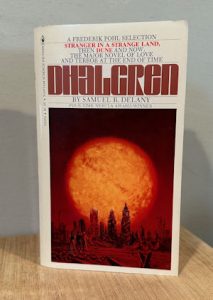- About the difference between “true” and “real” and recalling Delany’s DHALGREN;
- An essay about the reality of mathematics, and whether math implies God.
Years ago there was a novel — it was Samuel R. Delany’s 1975 novel DHALGREN — that has this epigraph:
“You have confused the true and the real.”
The line was attributed to George Stanley, in conversation, which means there’s no looking it up, except as used in this book.
For years I’ve been puzzled by the phrase. Isn’t what’s real true in some sense? Are there things that are true yet not real? Perhaps that’s it.
But just a few days ago I had an insight. The phrase’s meaning depends on the contexts of the two key words, of course, and recent years of increasing mis- and disinformation have brought a context to those words, perhaps not one not intended by Stanley, or Delany. It’s the other way around from what I just suggested.
So here’s my take:
It’s a reality that people have many beliefs. And many of these beliefs are not true. (In so many ways.)
\\
Here’s another piece about math, and in this case I’m not sympathetic to the argument, which I’ve seen before.

NY Time, guest opinion essay by Alec Wilkinson, 9 Feb 2024: Math Is the Answer to More Than One Question
Wilkinson published a book, A Divine Language: Learning Algebra, Geometry, and Calculus at the Edge of Old Age a year and a half ago, and reading the description at the time, I passed on it. It was fascinating that someone might want to learn math later in life (rather than being forced to as a student in high school), but his conflation of math with the “divine,” as he gives away his premise in his title, struck me as deeply wrong-headed. The essay here is published on occasion of the paperback reprint edition of his book. I still think it’s wrong-headed.
Let’s follow the essay through. It begins thus:
I am surprised at this late stage, in my 70s, to be thinking about God. In my defense, I might say that I did not arrive at these thoughts by reflecting on my own inevitable end or from a religion or a Scripture or the example of a holy figure. I arrived by means of mathematics, specifically simple mathematics — algebra, geometry and calculus, the kind of mathematics that adolescents do.
Several years ago, I decided that I needed to know something of mathematics, a subject that had roughed me up cruelly as a boy. I believed that not knowing mathematics had limited my ability to think and solve problems and to see the world in complex ways, and I thought that if I understood even a little of it, I would be smarter. My acquaintance with mathematics is still slight. I am only a mathematical tourist, but my experience has led me to believe that mathematics is rife with intimations of a divine presence.
He recounts how ancient philosophers, and even early scientists like Newton, thought this was so.
A couple of simple mysteries, available to anyone, help explain why this might be so. The first is the question of whether mathematics is created or discovered. Some mathematicians believe that mathematics is a system invented by human beings and that it is shaped as it is by the tendencies of human beings toward particular types of thinking. This is a minority view. The majority believe that mathematics exists as if independently of human thought and that the discoveries that mathematicians make are a mapping of an independent and timeless territory, a sort of parallel world where nothing is good or evil but everything is true.
How infinity was thought to be a property of God, until Cantor and others came along to show that there are many infinities.
(I’ve come down on the side of “discovered.” Given finite elements of the real (true) world, how they combine, how they relate, how else could mathematics be? I’ve seen speculations that creatures who live in water, or some equivalent, might not have the same distinction that humans do about individual “things”; perhaps they think in terms of surfaces and flows. But that would not render the mathematics humans have conceived of untrue. It would just extend discovered mathematics to realms humans have not thought of.)
The writer finishes,
Immanence is a second cousin once removed to pantheism, of course, the notion that God is in everything, and closer to the Greeks than to Christian monotheism. Perhaps not surprisingly, I was separated from this notion in Sunday school. There I was taught that God inhabited a book and the form of a singular man. It isn’t so much that I resisted these premises as that they didn’t stir anything within me. I didn’t connect them to the feelings that I had had alone in the woods. I gave up.
I am grateful to have a sense of mystery returned to me by mathematics. I am pleased to have been given, from an unexpected source, a reason both humbling and human to feel that there is more to life than I might believe there to be. And even if created by men and women, mathematics, as I read somewhere, is the longest continuous human thought, a circumstance that is itself worth regarding with awe.
The huge flaw here is the discovery, by Wilkinson and many others, of “awe” in mathematics, or patterns in the real world, even beautiful sunsets, somehow translates into equivalence with the childish view of God as Jesus who answers your prayers. Theists use this argument all the time. They *want* to believe in God, especially as someone who watches over you, brings justice to the world, and so on.






